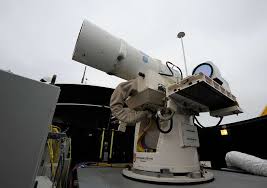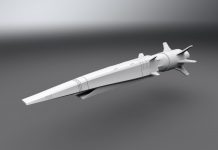
MBDA UK has secured a £316 million ($414 million) contract to equip the Royal Navy with its DragonFire laser weapon, designed to neutralize drones. The Ministry of Defence announced that the first shipboard installation—on a Royal Navy destroyer—is planned for 2027.
Recent trials at the Hebrides range in Scotland showed DragonFire successfully destroying a fast-moving drone, marking a major step toward fielding Europe’s first high-energy laser weapon, according to the MoD’s Nov. 20 announcement.
As inexpensive drones become widespread in modern conflicts, militaries are urgently searching for cost-effective defenses. DragonFire offers a significant economic advantage: each laser shot costs roughly £10, compared with the hundreds of thousands of pounds required for a single intercept missile, the MoD noted.
“This advanced laser technology places the Royal Navy at the forefront of NATO innovation, giving us a powerful new tool to protect the U.K. and our partners,” said Minister for Defence Readiness and Industry Luke Pollard.
The DragonFire program is being developed jointly by MBDA UK, QinetiQ, and Leonardo and is expected to be delivered nearly five years ahead of its original schedule. The MoD says the system is precise enough to strike a £1 coin from a kilometer away.
“This new contract represents another major step forward,” said Chris Allam, Managing Director of MBDA UK. “It enables us to move into the next phase and reinforces the U.K.’s commitment to leading the field in laser-directed energy weapons.”
DragonFire first destroyed an airborne target in a test firing in January 2024. In more recent demonstrations, the weapon intercepted drones traveling at speeds of up to 650 km/h, the MoD reported.
The U.K.’s Strategic Defence Review has also allocated nearly £1 billion this parliamentary term to further advance directed-energy technology. The DragonFire project alone is expected to support around 590 jobs across the country.
MBDA aims to begin delivering operational systems to the Royal Navy starting in 2027, with the first installation planned for a Type 45 destroyer.
Although MBDA is widely recognized for its missile systems—including the Mistral and Aster families—the company is actively pursuing laser-weapon programs across its partner nations. Executives expect high-energy lasers to play a key role in future layered air-defense networks.
Last month, MBDA and Rheinmetall provided Germany with a naval laser demonstrator, and MBDA is collaborating with Leonardo in Italy on a lightweight naval laser system. In addition, MBDA and Safran acquired a majority stake in French firm Cilas in 2022; Cilas is developing the Helma-P counter-drone laser for the French military.




